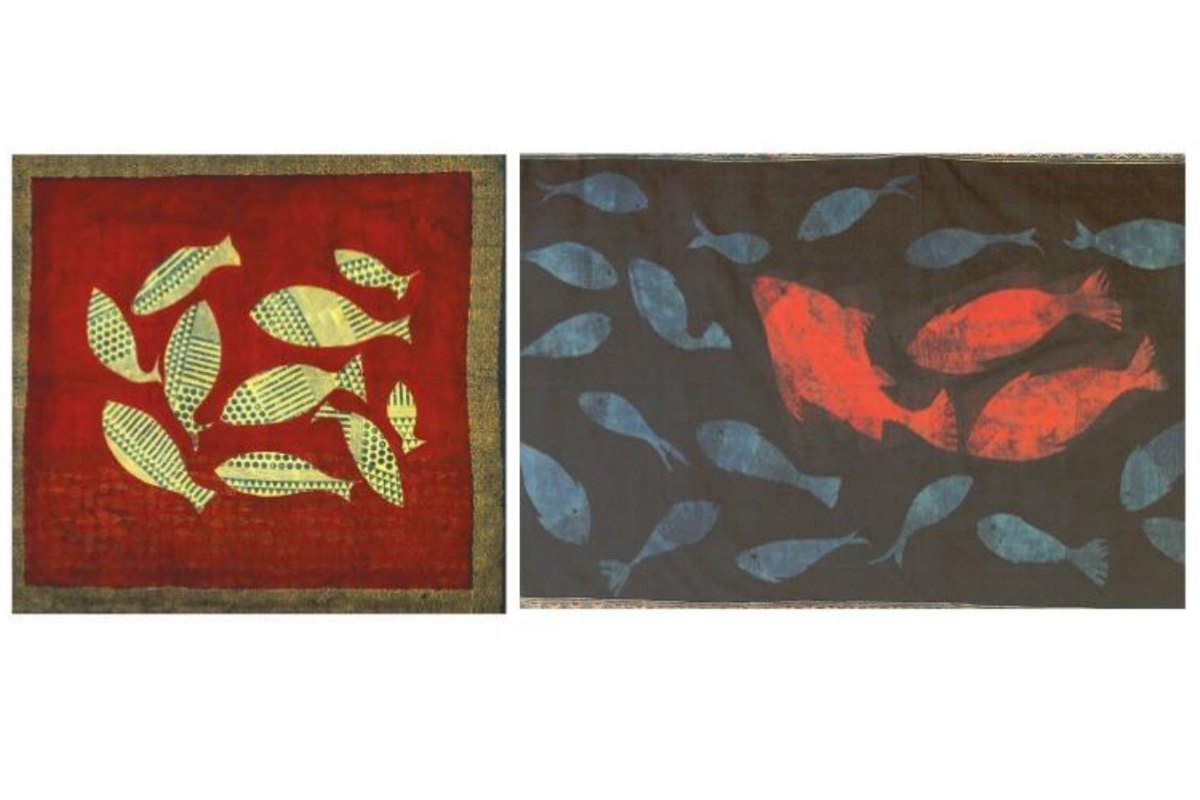Mahatma Gandhi’s timeless ideologies have been at the core of Delhi-based visual artist Shelly Jyoti’s art practice for more than a decade now. Using khadi as her canvas, Ajrakh dyeing and printing as her palette and intricate needlework as her brush strokes, the solo show titled Bound by Duty: An Idea of Swaraj and Collectiveness, currently showing at the India International Centre, Art Gallery, Kamala Devi Complex, is a continuation of Jyoti’s explorations of Gandhi’s concept of Swaraj.
Using intricately relief carved wooden printing blocks, some of them virtually 100 years old, as part of her tools, Shelly has adopted the motif of fish, both as individual entity and a collective force. She has delved into what might well be one of the worst challenges facing mankind today ~ the disparity between economic growth, ethnic and ecological well-being. “Ecology is understood both as man’s outer and inner environment, which now stands completely relegated, consumed by mankind’s greed and materialism,” Jyoti said.
Advertisement
To signify the idea of “collective force” that can cause social change Jyoti uses the imagery of fish ~ as to how out of the microorganisms underwater, a shoal of tiny fish can together displace enough volume to turn the waves and create a current by sheer force of numbers and togetherness. This is her idea of collective impact, one that could bring about social change. In agreement with the artist, one may surmise that in a evolved, spiritually self-aware, and naturalistic community such as ours is supposed to be, resistance to the on going apish, materially driven change could well be from an internal environment.
The exhibition, best explained in the artist’s own words, ringing straight from both head and heart, includes an 80- feet-long site-specific installation of four panels, 30 new Ajrakh art scrolls on khadi, multimedia spoken word poetry and a short film on making of Swaraj and collectiveness.
Speaking about the installation, Civilisation and Collective Forces, Jyoti said, “This 80-feet long installation, representing sequential movement, alludes to the nature of time itself. It calls to mind the endless ebb and flow of tides, the continual revolution of the sea and the state of perpetual motion. The gradual folding of schools of fish and merging of hues of indigo blue amalgamate to make a whole, akin to water as the beginning and end of life.
Civilisation and Collective Forces is inspired by the idea of collective community emphasising human worth in comparison to modern civilisation, where the principle of purshrathbecomes a search for fulfilment in the present material world and which places a larger emphasis on material comforts.” Another site-specific work in the paper titled The print:Hind swaraj, seeks to reach out to the masses with a text that was written 100 years ago and exploring its relevance 100 years later. She said, “These works are inspired by Gandhi’s seminal anti-imperialist text, Hind Swaraj, written in 1909, on his critique on modern civilisation, noting the emphasis on an evolved, ethical and spiritual self for creating an alternate perspective of a better world.”
Inspired by the idea of social responsibility, she grapples with the idea of direly threatened relationships between self, societies and social transformation in today’s fast-paced technology driven world. “I was seeking a response to the idea of swadharmaas a notion of patriotism. I also wished to understand the ways in which a modern civilisation such as India, that has achieved so much economically, and has become such a significant culture and country globally, could still connect with 70 per cent of her rural population that still remains illiterate. It is in this context that I eventually decided to re-read key writings of Gandhi for insights, as in his world the ethical and spiritual self is embedded in the realm of political struggles for justice.”
Aesthetically exemplary and convincing, in genuine development of traditional Indian art and craft, Shelly Jyoti’s work makes the country proud, and of sure worldwide value in terms of thought, content and intent. Running till September 27, it is well worth a visit. The show moves to Jehangir Art Gallery, Mumbai, from 27 November to 4 December.











